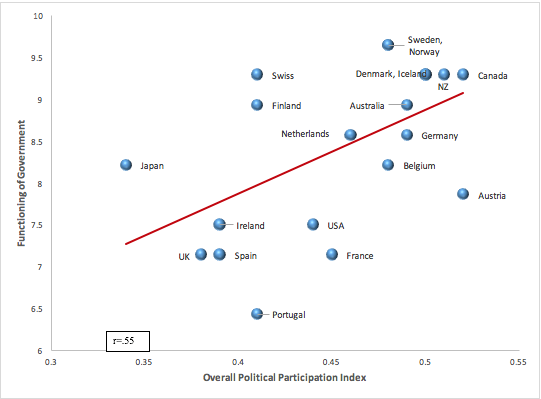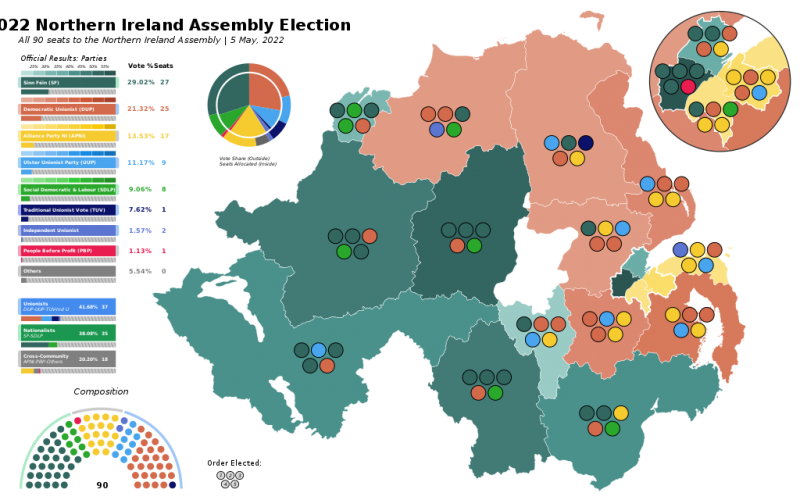 The more people who participate in a democracy, the more democratic it becomes – or so de Tocqueville believed. But sceptics have challenged that assumption on the basis that not everyone has the skills to make informed political decisions. In his new book, Russell J Dalton argues that the problem lies with the participation gap: the better-off are more engaged in policy, while the poorest vote less and lack the resources to lobby for change.
The more people who participate in a democracy, the more democratic it becomes – or so de Tocqueville believed. But sceptics have challenged that assumption on the basis that not everyone has the skills to make informed political decisions. In his new book, Russell J Dalton argues that the problem lies with the participation gap: the better-off are more engaged in policy, while the poorest vote less and lack the resources to lobby for change.
It seems an odd question, but researchers are increasingly asking whether citizen participation is good for democracy. Robert Putnam’s concern about apparently diminished participation in the US reflects a Tocquevillian belief that more citizen participation benefits society and the polity. Many political observers lament the decline in voting turnout across the established democracies and view this trend as detrimental to the democratic process.
In contrast, a different chorus of experts claim that democracy suffers because too many active citizens lack the abilities and resources to make meaningful decisions. Some sceptics state that democracy is based on “fairy tales” and “folk theory” because of the limitations of the citizenry. Other voices seemingly yearn for an epistocracy where the knowledgeable decide. Thus, the experts agree: contemporary democracies are suffering; the reason is either too little or too much citizen participation.
My forthcoming book, The Participation Gap, argues that both critiques are flawed. Contemporary democracies face a dilemma, but it involves balancing the actual expansion of citizen participation against its unintended effect on widening the social status participation gap. Besides the strong normative argument for political equality, I show that the absolute level of participation and the inequality in participation are both linked to the quality of democratic governance.
The expansion of citizen participation
I primarily examine evidence from the International Social Survey Program that measured citizen participation in established democracies in 2004 and 2014. The decline in voting turnout is obvious and a very troubling trend. However, the good news is that democratic institutional reforms and citizen innovation have increased the number and variety of access points that people can use to influence political outcomes. The expansion in citizen skills and resources also enables more people to engage in these more demanding forms of participation.
Direct contact with political leaders has increased. More people are joining public interest groups, civic associations, Bürgerinitiativen, and other collective forms of action. People have developed new methods of political action, such as political consumerism, new forms of contentious action and creative activism. The internet enables new methods of peer-to-peer involvement among citizens who share political views and want to be active. The ISSP surveys thus describe an interested and involved citizenry, more engaged than their parents’ or grandparents’ generation. Many of these activities also offer greater policy content and policy focus than the simple act of voting.
Rising political inequality
It is not all good news, however. While participation opportunities have broadly expanded, the skills and resources to utilise these new entryways are unevenly spread throughout the public. I describe a sizeable socio-economic status (SES) participation gap across all types of political action. A person’s education and other social status traits are very strong predictors of who participates.
The expanding repertoire of political action widens this participation gap. Participation research often focuses on voting turnout, but this is where the social status gap is generally smallest. Labour unions, citizen groups, and political parties can mobilise lower status voters on election day. However, as citizens become more active in non-electoral forms of participation, skills and resources are even more important in facilitating these activities. To write a letter, work with a community group, post a political blog or boycott environmentally damaging products requires more than just showing up on election day to mark a ballot and leave. So the expanding repertoire of political activity widens the SES participation gap.
The participation gap is also widening over time. Evidence from several nations shows that the decline in voting turnout is concentrated among lower-status citizens, while the better off continue to vote at roughly the same levels as the past. Given the centrality of elections in selecting the officials who govern, this widening participation gap in turnout implies unequal representation with all the implications that this signifies.
For non-electoral participation, the increase in activity has come disproportionately from better-educated and higher income citizens who possess politically valuable skills and resources. Protest activities often display the widest social status participation gap. And while there is a one-person/one-vote limit on voting that moderates inequality, no such ceiling exists for writing emails, working with public interest groups, protesting, and other non-voting forms of action. The sum result is a widening in the SES participation gap in overall terms.
Thus, democracy’s dilemma is that the expansion of participation in old and new forms comes at the cost of a widening gap between the politically rich and the politically poor. This runs counter to democratic ideals, and it runs counter to democracy’s goal of effectively reaching the best policy outcomes for society by involving all of the public in the process.
Participation, inequality and governance
The two views of citizen participation summarised at the start of this post offer contrasting assessments of whether an active citizenry improves or harms the functioning of democratic governance.
I directly consider the basic Tocquevillian logic that democracy will benefit when more citizens participate. There are many potential ways to test this thesis, and I turn to the simple example of the quality of governance. Does government function better if the public is more involved? The Economist Intelligence Unit’s measures the quality of governance with a 14-item index of the functioning of the government, including items such as quality of administration, government control of its territory, regularised government and the rule of law. (There is no explicit item on participation in the index.). The 2004 ISSP provides overall participation levels for about a dozen and a half nations, plus Belgium and Iceland from the 2014 survey. I test whether an active citizenry correlates with good governance.
Nations with higher overall political participation also have better performing government (Figure 1). This is a substantial relationship based on these 20 democracies (r=.55, p=.01). Nations that score highly on the EUI index, such as Norway, New Zealand, Canada and Denmark, also have fairly high levels of overall citizen participation. Conversely, the four lowest levels of participation occur in nations that are below average in the functioning of government. This supports the general logic that an attentive and involved public press the government to be more responsive and effective. Simply put, good citizens make for good democratic governance.
Figure 1: Citizen participation and the functioning of government
 Source: Overall political participation is from the 2004 ISSP, 2014 for Belgium and Iceland; functioning of government is from the Economist Intelligence Unit.
Source: Overall political participation is from the 2004 ISSP, 2014 for Belgium and Iceland; functioning of government is from the Economist Intelligence Unit.
We can go one step further: does inequality in participation detract from democratic governance? Voices are unheard, needs are unmet, and government acts without full information when inequality is substantial.
Figure 2 displays the independent effects of overall participation level and the inequality of participation on good governance. (Inequality is the total strength (Multiple R) of four social status traits in predicting participation levels.) In addition to the EIU index, I include the World Bank’s measure of government effectiveness, which measures traits such as the quality of public services, performance of the civil service, and the quality of policy formulation and implementation. The contrasting – and independent – effects of both aspects of participation are quite clear. The overall level of citizen participation is positively related to both measures of good governance. Even with a small number of countries, these are significant relationships.
Figure 2: Participation, inequality and the functioning of government
 Note: Figure entries are standardised regression coefficients from OLS regression. Source: Overall political participation and the inequality of participation are from the 2004 ISSP, 2014 for Belgium and Iceland; functioning of government is from the Economist Intelligence Unit and the World Bank.
Note: Figure entries are standardised regression coefficients from OLS regression. Source: Overall political participation and the inequality of participation are from the 2004 ISSP, 2014 for Belgium and Iceland; functioning of government is from the Economist Intelligence Unit and the World Bank.
Equally important, when there is large SES inequality in overall participation, good governance is lower. In sum, the best democratic governance generally occurs with citizens are more active and the participation gap is smaller.
In conclusion
Arend Lijphart used his 1996 presidential address to the American Political Science Association to make both the political and normative arguments that inequalities in voting turnout are detrimental to the democratic process: “unequal participation spells unequal influence—a major dilemma for representative democracy.” Now Lijphart looks like the optimist, because time and the expansion of political repertoires has only worsened this dilemma.
I recognise that a more active citizenry makes governing more complex. Few civil servants sit at their desks hoping to hear from dissatisfied citizens. Public hearings and transparent government can slow the decision-making and administrative processes. It is easy to understand why there are concerns about the complications of governance if more citizens participate in more ways. The NIMBY syndrome, veto groups and other challenges to technocratic decision-making often appear. But democracy’s goal is not to maximise efficiency, but rather to balance social interests and eventually make good (or at least better) decisions than epistocratic or autocratic alternatives.
Democratic theory also holds that societies benefit in the long run from the participation of all its citizens; Larry Bartels demonstrates that policy outputs are often biased to the affluent, while the needs and preferences of the most needy can be overlooked if they are uninvolved. The human, social and economic costs of deindustrialization are greater in the long term if they are ignored, rather than addressing the needs of displaced workers. The lost productivity, life quality, and diminished societal contributions that may follow from the participation gap are substantial. And with a deficit of political representation, some citizens may turn to populist or extreme options that offer them voice. An active and relatively equal public go together with good governance.
This is painting on a large canvas with broad, imprecise brush strokes. Even multi-indicator measures of the functioning of government are imprecise. More sophisticated modelling is needed to assert causality. Do good citizens make good governments, or do good government make good citizens? To some extent, both are true; these things go together regardless of the direction of causality. Yet, while others theorise and write op-eds on the perils of citizen participation in the democratic process, the empirical evidence suggests otherwise. These exploratory data reaffirm the argument from Thomas Jefferson to Alexis de Tocqueville to Sidney Verba: Expanding the public’s voice is essential to have a democratic polity and broadly improves the quality of governance. The dilemma for democracy is to embrace a more active public, while ensuring the equality of political voice at the same time.
______
Note: This article originally appeared at our sister site, Democratic Audit.
 Russell J Dalton is Professor of Political Science at the University of California, Irvine.
Russell J Dalton is Professor of Political Science at the University of California, Irvine.








Great post! Thank you, you have explained it so nicely. Now a day’s citizenship is so important for Indian citizens, it helps in educating people and specially children.It is very important for our students in colleges & Schools.
I’d be interested in how the Overall Political Participation Index was calculated. I’ve lived in France, Finland and the UK – and I can say that they have very different types of ways in which citizens can participate in politics – and of those 3 I find the UK being the least functional or participatory as you’re basically going against a stone wall of political party structures that are impenetrable unless you bombard the MPs with multiple forms of citizen participation, demonstration and dissent to show your ‘voice’ as the system of First Past the Post (FPTP) means that my vote will never count in electing my MP as I’m living in a ‘safe’ Tory seat (apart from the EU elections which were proportional). In contrast, in Finland every single political vote counts 100% as different counties have more than 10 MPs elected, and my party (or list if parties choose to merge lists – but they rarely do) preference is respected even if my chosen candidate does not get through. Also in Finland, municipal elections count a lot as municipalities get an automatic allocation of corporate tax, income tax (which they can set within parametres), and they are responsible for basic health / education / childcare, and thus they are really in control. This in contrast in the UK, where central governmetn can choose to cut, bully or divert funds from local government (county government, and local authorities), and local elections mostly matter for issues related to planning laws, building laws, roads and rubbish collection as effectively services are run by central government and many are privatised. So citizen participation in Finland is much more about lobbying your representatives directly, as a) they are likely to share your values, and b) they have the power to take decisions on your behalf. In the UK, I have to assume that living in a ‘Tory’ area (and same for Tories living in Labour areas btw) have no choice but to go for maximum citizen participation as formal systems of democracy are utterly broken, as we have now seen with the Brexit issue and subsequent political mess the country finds itself.
Any kind of system models should evolve in order to meet with human life evolution expectations and needs. Democratic models in countries who are the most advanced in socioeconomic performance and governance, are being constantly revised for ongoing improvement. Thus, for the sake of democracy preservation, political sciences are to be revamped.
Very analytic, convincing and well-researched piece of reading. I enjoyed it a lot. I have been researching citizen participation in a situation where mechanisms for participation were initially designed to be exercised in the representative settings of democracy, but they were failed (i.e. absent of local elections) to operate in the original settings. Interestingly, however, administrative officials continued to steer the participation process though there are questions as to what extent administratively run participatory processes have achieved the goal of participation.
The next question would be: Can citizen participation still be good for democracy when administration (instead of politicians) steer the participation processes?
Our representative democracy (an oligarchy – ‘rule of the few’) does not produce policies that reflect the informed will of the people. This is due to its privileged make up, vested interests, and the influence of wealthy individuals and corporate money on party politics.
Digital has driven campaign participation by the 99% but is largely proven to be irrelevant to outcomes. Citizens have no constitutional political power in the years between the blunt electoral process.
We need a bottom-up, citizen-driven real democracy (‘people power’). One that enables governance bodies which are descriptive of the demographics and socio-economics of the general population (sortition); and which educates its participants. The Greeks understood this.
The alternative? Our Roman model of representative ‘democracy’ follows the course of Roman history into decline, emperors and a great fall. I think we may be there.
Great article. I’d guess the next question would be. Is Democracy (as it is today) good for society? With the newly developed technology we have seen how ‘bordering on the truth’ slogans have recently been used to gain supporters. Populism is on the rise and voters are increasingly being asked to cast a vote without enough information. The information of how to govern is so complicated that an appeal to emotion is made, rather than on actual policy.
See for example, the Tory manifesto in the last elections that was *never* to be implemented but it gained supporters of the electorate.